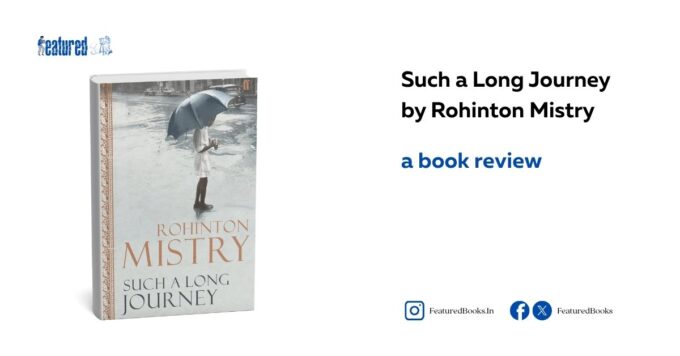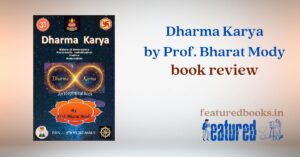Rohinton Mistry’s Such a Long Journey, first published in 1991, is a novel that lingers in the mind long after the final page is turned. Set against the backdrop of early 1970s Bombay, a city teetering between tradition and modernity, the book weaves together the personal and political with a quiet, devastating precision. At its heart is Gustad Noble, a middle-aged Parsi bank clerk whose life unravels in ways both mundane and extraordinary. Mistry’s prose is unassuming yet richly textured, drawing the reader into Gustad’s world with a rare combination of empathy and restraint. The novel is as much a portrait of a man in crisis as it is a sharply observed commentary on a nation in flux, where the grand narratives of war and corruption seep into the cracks of everyday existence.
Gustad Noble is one of those ordinary characters who, in the hands of a skilled writer, becomes extraordinary. A devoted family man, a loyal friend, and a man of quiet faith, Gustad is the kind of figure who might go unnoticed in a crowd. Yet Rohinton Mistry renders him with such depth and nuance that his struggles feel universal. His frustrations—with his son’s refusal to attend the prestigious Indian Institute of Technology, his crumbling apartment, his sense of stagnation—are all too human. But what makes Gustad truly compelling is his moral complexity. When an old friend, Jimmy Bilimoria, draws him into a shadowy political scheme involving embezzled funds, Gustad’s initial reluctance gives way to reluctant complicity. This moral ambiguity is where Mistry excels, refusing to paint his characters in broad strokes of heroism or villainy. Gustad is neither wholly good nor irredeemably flawed; he is simply a man trying to navigate a world that seems increasingly indifferent to his struggles.
The novel’s political backdrop is impossible to ignore. The year is 1971, and India is on the brink of war with Pakistan, a conflict that will eventually lead to the creation of Bangladesh. The Indira Gandhi government’s authoritarian tendencies loom large, and the infamous Nagarwala scandal—a real-life incident involving a mysterious figure who allegedly withdrew large sums of money from the State Bank of India using the prime minister’s name—serves as a pivotal plot point. Mistry’s genius lies in how he intertwines these historical events with Gustad’s turmoil. The political is not merely a setting but an active force that shapes and distorts the lives of ordinary people. The corruption and deceit at the national level mirror the more minor betrayals and disappointments in Gustad’s life, creating a narrative that feels both intimate and expansive.
One of the novel’s most striking features is its sense of place. Bombay, with its crowded streets, its Irani cafés, its Parsi enclaves, is as much a character as Gustad himself. Mistry’s descriptions are vivid but never overwrought, capturing the city’s rhythms and contradictions with a journalist’s eye for detail and a poet’s ear for language. The Khodadad Building, where Gustad lives, becomes a microcosm of the city itself—a place where petty grievances test communal harmony and where the past is always present, haunting the present like the lingering smell of spices in the air. The novel’s title, Such a Long Journey, refers not just to Gustad’s odyssey but to the collective journey of a nation grappling with its identity in the aftermath of colonialism and the throes of modernisation.
Mistry’s treatment of the Parsi community is another of the novel’s strengths. Parsis, a small but influential Zoroastrian minority in India, are often portrayed in literature as relics of a bygone era, clinging to their traditions in a rapidly changing world. Mistry avoids such stereotypes, presenting his characters with a blend of affection and clear-eyed realism. Gustad’s faith is not a quaint anachronism but a living, breathing part of his identity, one that offers him solace even as it occasionally feels like a burden. The rituals and superstitions of Parsi life, the prayers, the omens, and the fear of the evil eye are woven seamlessly into the narrative, adding layers of cultural specificity without ever feeling exoticised.
The novel’s supporting cast is equally well-drawn. There is Dilnavaz, Gustad’s wife, whose quiet strength and occasional superstitions provide both contrast and complement to her husband’s pragmatism. Their children, especially the rebellious Sohrab, embody the generational tensions that simmer beneath the surface of many immigrant and minority families. Then there are the neighbours—the eccentric Miss Kutpitia, with her talismans and prophecies, and the gentle Tehmul, a mentally disabled man whose innocence serves as a foil to the cynicism of the adult world. Each character, no matter how minor, is rendered with a depth that makes them memorable.
Mistry’s prose is deceptively simple. His sentences are clean and unadorned, yet they carry a weight that lingers. He has a knack for finding the extraordinary in the ordinary, whether it’s the way sunlight filters through a window or the sound of a spoon clinking against a teacup. His dialogue, too, is pitch-perfect, capturing the rhythms of Bombay’s multilingual chatter without resorting to heavy-handed transliteration. The novel’s humour, often wry and understated, provides moments of levity that make the darker themes all the more poignant.
A comparison with other novels reveals Such a Long Journey’s unique place in literature. Like V.S. Naipaul’s A House for Mr. Biswas, it explores the struggles of a man trying to carve out dignity in a world that seems determined to deny it. Both novels are deeply rooted in their respective cultures—Naipaul’s in Trinidad’s Indian diaspora, Mistry’s in Bombay’s Parsi community—yet their themes of identity, displacement, and resilience resonate universally. Similarly, Salman Rushdie’s Midnight’s Children shares with Mistry’s novel a preoccupation with India’s postcolonial turmoil, though Rushdie’s approach is more fantastical, his prose more exuberant. Mistry’s realism, by contrast, feels grounded, his tragedies quieter but no less devastating. Another apt comparison might be to Anita Desai’s Clear Light of Day, which also examines family dynamics against the backdrop of a changing India; however, Desai’s focus is more introspective, and her pacing is more languid. What sets Such a Long Journey apart is its balance of the personal and the political, its ability to make one man’s story feel like a window into an entire nation’s soul.
The novel is not without its flaws. Some readers might find its pacing deliberate to the point of sluggishness, particularly in the early chapters. Others could argue that the political subplot, while historically fascinating, occasionally feels like an intrusion into Gustad’s narrative. And yet, these are minor quibbles in a work of such depth and humanity.
In the end, Such a Long Journey is a novel that rewards patience. Its power lies not in grand gestures or dramatic revelations but in the accumulation of small, perfectly observed moments. It is a book about the weight of responsibility, the fragility of trust, and the quiet heroism of ordinary lives. Mistry does not offer easy answers or neat resolutions, but he does something far more valuable: he makes us see the world, and the people in it, with greater clarity and compassion. For that alone, the journey is worth taking.
Get a copy from Amazon India – click here.
Review by Ashish for Featured Books
..
Such a Long Journey by Rohinton Mistry, book review
- Featured Book's Rating
Summary
A chronicle… a personal reflection on a grand universal canvas… You can read it, relate to it, and feel it… too. However, over time, the details and their intensity may become trapped in the clogged conduit known as relevance.





